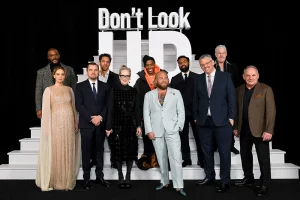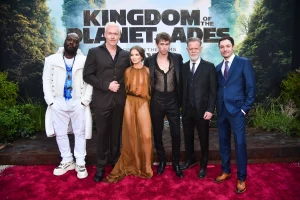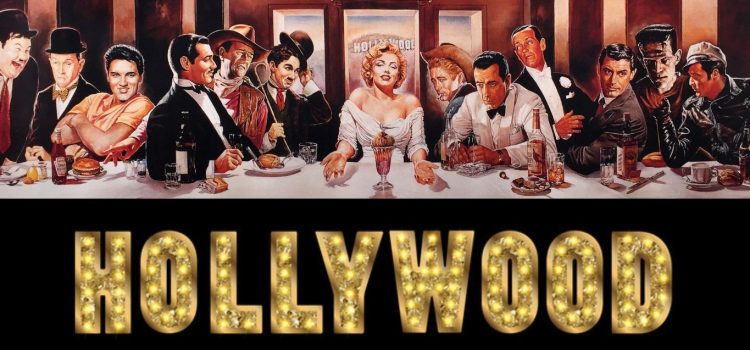
Introduction
Hollywood, the epicenter of the global film industry, has always been a reflection of the times, mirroring societal changes, technological advancements, and, crucially, global events. From wars and economic recessions to pandemics and political upheavals, these global events have had a profound impact on Hollywood productions. This article delves into how various global events have influenced the Hollywood landscape, affecting everything from production schedules and box office earnings to the very content and themes of the films themselves.
Historical Context

-
World Wars and Their Aftermath
The two World Wars had a significant impact on Hollywood. During World War I, the film industry was still in its nascent stages, but it quickly became a tool for propaganda. Films like “The Birth of a Nation” (1915) and “The Big Parade” (1925) showcased the war’s impact on society and helped shape public opinion.
World War II saw Hollywood take a more active role in the war effort. The industry produced numerous propaganda films to boost morale and support the Allied cause. Movies like “Casablanca” (1942) and “Mrs. Miniver” (1942) not only entertained but also served as powerful propaganda tools. Post-war, the themes in Hollywood shifted to reflect the changing societal landscape, with films exploring the psychological and social impacts of the war.
-
The Cold War Era
The Cold War brought about a different kind of tension, which was reflected in Hollywood productions. The fear of communism and nuclear annihilation led to a surge in science fiction and spy thrillers. Films like “Invasion of the Body Snatchers” (1956) and “Dr. Strangelove” (1964) captured the paranoia and absurdity of the era. The Hollywood blacklist, a result of McCarthyism, also had a profound impact on the industry, leading to the blacklisting of numerous writers, directors, and actors accused of having communist ties.
Economic Recessions and Financial Crises

-
The Great Depression
The Great Depression of the 1930s had a paradoxical impact on Hollywood. While the economic downturn led to widespread unemployment and poverty, people still flocked to the movies for escapism. Hollywood responded by producing a mix of escapist fare and socially conscious films. Musicals, comedies, and lavish productions like “Gone with the Wind” (1939) provided a respite from daily struggles, while films like “The Grapes of Wrath” (1940) highlighted the harsh realities of the time.
-
The 2008 Financial Crisis
The 2008 financial crisis had a more direct impact on Hollywood’s bottom line. With studios facing financial difficulties, there was a noticeable shift towards safer, more commercially viable projects. This period saw a rise in sequels, reboots, and franchise films, as studios sought to minimize financial risk. However, the crisis also led to a surge in independent filmmaking, with lower-budget films gaining prominence and critical acclaim.
Technological Advancements and Globalization

-
The Rise of Digital Technology
The advent of digital technology revolutionized Hollywood in the late 20th and early 21st centuries. Digital cameras, CGI, and advanced editing software transformed the way films were made, allowing for more complex and visually stunning productions. This technological shift also made filmmaking more accessible, leading to a democratization of the industry.
-
Globalization and International Markets
Globalization has had a profound impact on Hollywood, opening up new markets and changing the dynamics of film production and distribution. The rise of international markets, particularly in China, has led to Hollywood increasingly catering to global audiences. This has influenced everything from casting decisions to the themes and content of films. For instance, films like “Transformers: Age of Extinction” (2014) and “The Great Wall” (2016) were specifically designed to appeal to Chinese audiences.
Pandemics and Health Crises

- The COVID-19 PandemicThe COVID-19 pandemic has arguably had the most significant impact on Hollywood in recent history. The pandemic led to widespread shutdowns of film productions, delayed releases, and a shift towards streaming platforms. The traditional theatrical release model was upended, with many studios opting for digital releases. Films like “Trolls World Tour” (2020) and “Mulan” (2020) were released directly on streaming platforms, setting new precedents for the industry.
The pandemic also influenced the content of films, with themes of isolation, resilience, and social justice coming to the fore. Documentaries and films exploring the impact of the pandemic on various aspects of life have become more prevalent.
Political and Social Movements

-
The Civil Rights Movement
The Civil Rights Movement of the 1960s had a significant impact on Hollywood, leading to more diverse and representative storytelling. Films like “Guess Who’s Coming to Dinner” (1967) and “In the Heat of the Night” (1967) tackled issues of race and discrimination, reflecting the societal changes taking place.
-
The MeToo Movement
The MeToo movement, which gained momentum in 2017, brought about a reckoning in Hollywood. Numerous high-profile figures were accused of sexual harassment and assault, leading to a broader conversation about gender inequality and abuse of power in the industry. This movement has led to increased scrutiny and changes in industry practices, with a greater emphasis on diversity and inclusion.
Conclusion
Global events have always had, and will continue to have, a profound impact on Hollywood productions. From wars and economic crises to technological advancements and social movements, these events shape the industry in myriad ways. As Hollywood continues to navigate an ever-changing global landscape, it will undoubtedly reflect and respond to the challenges and opportunities that arise, continuing to be a mirror of the times.










